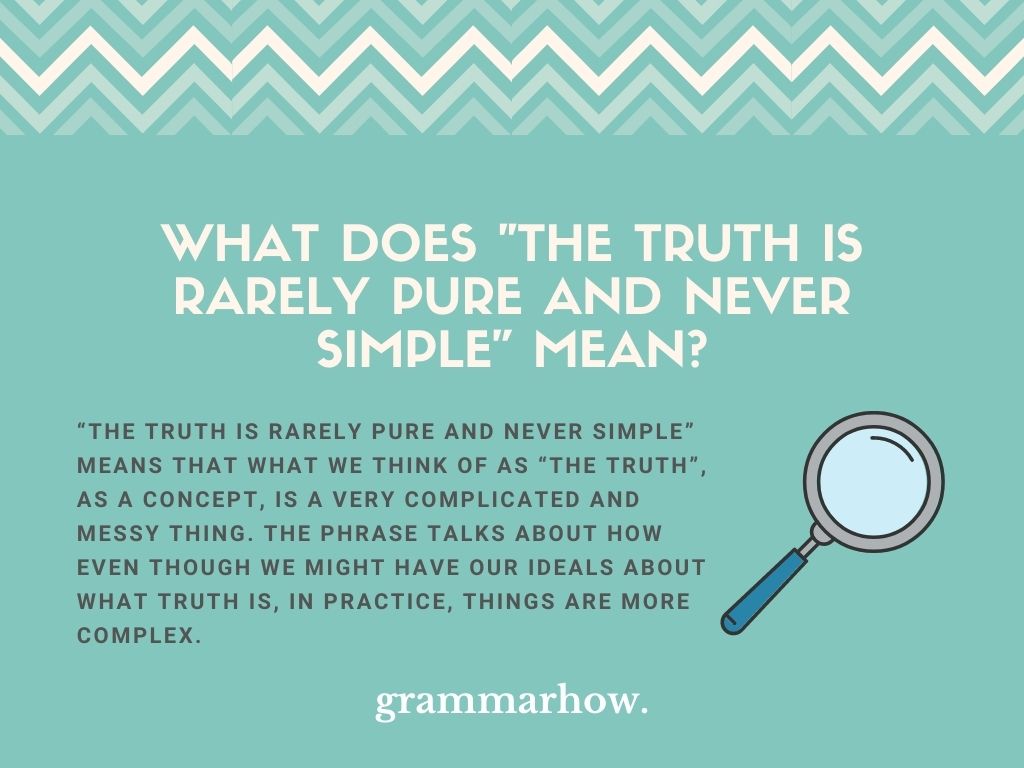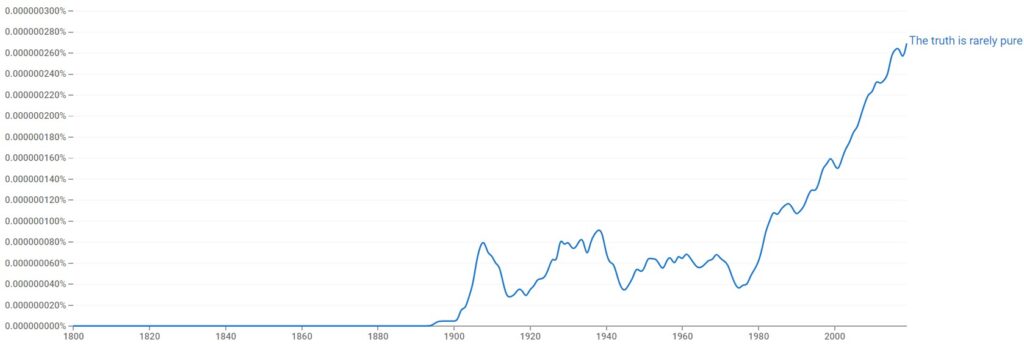And You Know Its Never Simple Never Easy
You might have heard the phrase "the truth is rarely pure and never simple" before, and maybe you were confused about it. Who said it? What was the context? And what does the phrase actually mean? This article will answer all of these questions.
What Does "The Truth Is Rarely Pure and Never Simple" Mean?
"The truth is rarely pure and never simple" means that what we think of as "the truth", as a concept, is a very complicated and messy thing. The phrase talks about how even though we might have our ideals about what truth is, in practice, things are more complex.

The phrase is fairly deep, and talks about how even though we tend to overtly simplify life into "truth" and "lies", things can often be in the middle, hitting a gray middle area.
The "rarely pure" part talks about how in real life, the truth is often made up of many smaller things that escalated, and not all of them are perfectly explainable or easy to understand.
"Purity" in this context would come from the ease of understanding why the truth is what it is, and in real life it's often impossible to fully know, therefore the truth is rarely pure.
The "never simple" part talks about how truth is a complex, complicated thing. It's not an objective measure that everyone agrees on.
Even the things that everyone seemingly agrees on often have many layers and angles that they can be observed from, and are complex in their own special way.
Who Said "The Truth Is Rarely Pure and Never Simple"?
"The truth is rarely pure and never simple" is a phrase first said by author Oscar Wilde in his play "The Importance of Being Earnest". The phrase is specifically said by one of his characters in a conversation in the play itself.
The origin of the phrase is as follows: The play follows a man who invents a fictional relative called Earnest, whom he uses as an excuse to miss social gatherings.
At a certain scene, he reveals the truth, and addresses a character by telling them "That is the whole truth, pure and simple".
The other character reacts by saying "the truth is rarely pure and never simple". We can see then what the phrase means in the context of the play, which is that things are complex.
One character believes the truth to be pure and simple, and the other character disagrees. This sort of disagreement is, in fact, an example of the way in which the titular phrase is correct.
How Popular Is the Saying "The Truth Is Rarely Pure and Never Simple"?
According to data supplied by the Google Ngram Viewer, "the truth is rarely pure and never simple" is a very popular phrase, and it is, in fact, in its popularity peak as of the most recent data gathered.

The phrase appears in writing in the late 1800s and not before that date, which makes a lot of sense when you consider the fact that the play the phrase appears in is from 1895.
The phrase experiences a peak in popularity up until 1907 or so, at which point it starts going down in popularity, presumably because the play's popularity is slightly wearing off.
Over the years, the play experiences peaks and valleys in popularity, which means that the phrase also experiences highs and lows in popularity.
At the end of the 1970s, the play experiences a surge in popularity that never quite wears off, and from that decade onwards starts its increase in popularity that has lasted until the present day.
"The Truth Is Rarely Pure and Never Simple" – Synonyms
Though this is of course a very specific phrase from a particular play, the truth is that this exact sentiment can be expressed in a wide variety of ways. Here are some of those ways:
- Things are complicated and not easy to understand.
- Life isn't always black and white.
- It's not always easy to discern right and wrong.
- The truth is messy and hard to fully understand.
- People are complex, so the truth is, too.
Final Thoughts
"The truth is rarely pure and never simple" is a phrase that comes from the Oscar Wilde play "The Importance of Being Earnest". It talks about how things in life are not black and white, and what we think of as "the truth" can be really subjective.
Martin is the founder of Grammarhow.com. With top grades in English and teaching experience at university level, he is on a mission to share all of his knowledge about the English language. Having written thousands of articles, he is an expert at explaining difficult topics in a simple language.
Connect with Martin on LinkedIn.
Source: https://grammarhow.com/the-truth-is-rarely-pure-and-never-simple/
0 Response to "And You Know Its Never Simple Never Easy"
Post a Comment